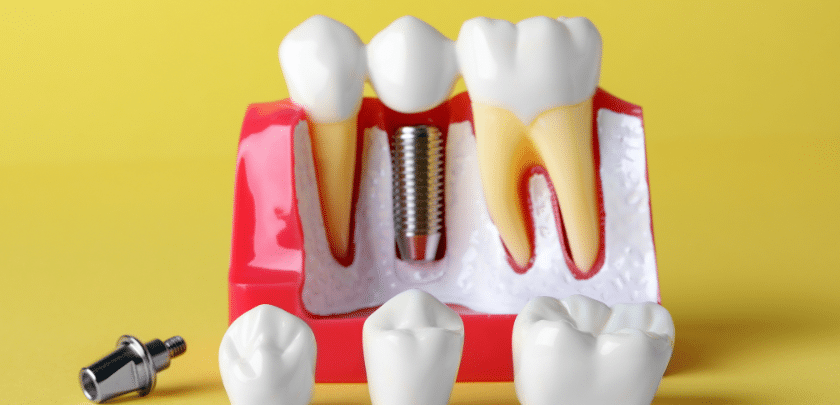
Welcome to our blog, where we’re diving into the world of dental implants! If you’ve been considering replacing missing teeth or improving your smile, then this post is for you. Dental implants have revolutionized the field of dentistry, offering a permanent solution that looks and feels just like natural teeth. Whether you’ve lost a tooth due to injury or decay or want to enhance your overall oral health, dental implants can be a game-changer. So, let’s explore why dental implants should be on your radar and how they can transform not only your smile but also your quality of life. Let’s get started!
What Are Dental Implants?
Dental implants are more than just a cosmetic solution for missing teeth; they are a modern marvel of dentistry. Dental implants are artificial tooth roots that are surgically implanted into your jawbone to support replacement teeth or bridges. Made from biocompatible materials like titanium, these implants fuse with the bone over time, creating a strong and stable foundation.
One of the key advantages of dental implants is their ability to mimic the natural function and appearance of real teeth. Unlike dentures or bridges, which sit on top of the gums or rely on neighboring teeth for support, dental implants integrate seamlessly with your existing oral structure. This means you can eat your favorite foods without worrying about discomfort or slippage.
Beyond aesthetics and functionality, dental implants also offer long-term benefits for oral health. When a tooth is lost, the underlying jawbone may start to deteriorate over time due to lack of stimulation. Dental implants help prevent this bone loss by providing necessary stimulation through chewing and biting forces.
Getting dental implants involves several stages that require careful planning and collaboration between you and your dentist. Initially, a comprehensive examination will be conducted to assess your overall oral health and determine if you’re an ideal candidate for implant surgery.
Once deemed suitable for the procedure, the implant placement phase begins with minor surgery under local anesthesia. During this stage, small incisions are made in the gum tissue, where each implant will be inserted into the jawbone.
Following surgery, there is usually a healing period known as osseointegration that allows time for proper integration between the implant(s) and surrounding bone tissue. This process typically takes several months but ensures optimal stability before moving forward with attaching replacement teeth.
It’s important to note that only some are automatically eligible for dental implant treatment; certain factors need consideration beforehand. Good overall health, along with healthy gums free from periodontal disease, is crucial since these conditions can affect successful outcomes.
Benefits Of Dental Implants
1. Improved Appearance: One of the biggest benefits of dental implants is that they look and feel like natural teeth. The implant is designed to fuse with the bone, making it a permanent solution for missing teeth.
2. Enhanced Oral Health: Dental implants don’t require altering adjacent teeth, unlike bridges or dentures. This means that your healthy teeth remain intact, promoting better oral health in the long run.
3. Increased Comfort: Unlike removable dentures, which can be uncomfortable and cause irritation, dental implants become a part of you, ensuring a comfortable fit and improved speech.
4. Improved Eating Ability: With dental implants, you can enjoy all your favorite foods without any restrictions. They provide strong biting force and stability similar to natural teeth, so you can confidently chew on anything you desire.
5. Long-lasting Solution: Unlike other tooth replacement options, which may need to be replaced over time, dental implants are built to last for many years – even a lifetime – with proper care.
6. Boosted Self-Confidence: Restoring your smile with dental implants can significantly enhance your self-esteem and confidence levels by giving you back a beautiful and complete set of teeth.
7. Preserved Facial Structure: Missing teeth can lead to facial sagging and premature aging due to bone loss in the jaw area. Dental implants stimulate bone growth, preserving your facial structure for a youthful appearance.
Dental implants offer numerous benefits, including improved appearance, enhanced oral health, increased comfortability while eating or speaking, longevity as a long-term solution compared to other options such as dentures or bridges, boosting self-confidence through restoring one’s smile, preservation of facial structure preventing premature aging caused by tooth loss-induced bone deterioration.
Types Of Dental Implants
- When considering dental implants, it’s important to understand that there are different types available. The type of implant you choose will depend on your specific needs and the recommendations of your dentist.
- One common type of dental implant is the endosteal implant. This is the most frequently used type and involves placing a titanium post directly into the jawbone. Once this has healed, an artificial tooth or crown can be attached to the post.
- Another option is the subperiosteal implant. Unlike endosteal implants, these are placed on top of the jawbone but underneath the gums. They consist of a metal frame that sits on top of the bone and protrudes through the gum line to hold a replacement tooth or teeth in place.
- For patients who have insufficient bone density or height in their jawbone, there may still be options for dental implants. Procedures such as bone grafting or sinus lifts can help create a stable foundation for traditional implants or allow for alternative techniques like zygomatic implants.
- It’s worth noting that not all individuals will be suitable candidates for every type of dental implant. Factors such as overall oral health, bone structure, and personal preferences will play a role in determining which option is best for you.
- Working closely with your dentist will ensure that you receive personalized recommendations based on your unique circumstances and goals.
The Process Of Getting Dental Implants
First, a thorough examination and consultation with your dentist will be conducted to determine if you are a suitable candidate for dental implants. This may include taking X-rays or CT scans of your mouth to assess the condition of your jawbone.
If you are deemed eligible, the next step is the surgical placement of the implant into your jawbone. This procedure is usually performed under local anesthesia, ensuring minimal discomfort during the process.
After the implant is placed, a healing period called osseointegration takes place. During this time, which can range from a few weeks to several months, the implant fuses with the surrounding bone tissue.
Once osseointegration is complete, an abutment is attached to the implant. The abutment serves as a connector between the implant and the replacement tooth (crown) that will be placed on top.
Custom-made crowns are created and securely attached to the abutments. These crowns not only restore functionality but also provide aesthetic improvement by matching your natural teeth in color and shape.
It’s important to note that each individual’s journey toward getting dental implants may vary depending on their unique circumstances and oral health conditions. Therefore, it’s crucial to consult with an experienced dentist who can guide you through every step of this transformative process.
Factors To Consider Before Getting Dental Implants
Before considering dental implants, there are several important factors that you should take into consideration. It’s crucial to consult with a qualified and experienced dentist who specializes in implant dentistry. They will assess your oral health, examine the condition of your jawbone, and determine if you are a suitable candidate for dental implants.
Another factor to consider is the cost of the procedure. Dental implants can be more expensive compared to other tooth replacement options, such as dentures or bridges. However, they offer long-term benefits and durability that make them worth the investment. It’s essential to discuss the cost and financial options with your dentist beforehand.
Additionally, you should also evaluate your overall health before getting dental implants. Certain medical conditions like diabetes or autoimmune disorders may affect the success rate of the implant surgery. Your dentist will review your medical history and work closely with you to ensure that any potential risks are minimized.
Furthermore, it’s important to have realistic expectations about the outcome of dental implant treatment. While modern advancements in technology have greatly improved success rates, individual results may vary depending on various factors such as bone density and oral hygiene practices.
Consider the time commitment required for dental implant treatment. The process typically involves multiple appointments spread over several months from start to finish. It’s important to understand this timeline and be prepared for regular follow-up visits during the healing stages.
By carefully considering these factors before undergoing dental implant treatment, you can make an informed decision that aligns with your oral health goals and ensures a successful outcome in restoring your smile functionality.
Aftercare And Maintenance For Dental Implants
- Aftercare and maintenance for dental implants are crucial in ensuring the longevity and success of your new teeth. Once you have undergone the implant procedure, it’s important to take proper care of your implants to keep them in optimal condition.
- Maintaining good oral hygiene is key. This includes brushing your teeth at least twice a day using a soft-bristle toothbrush and non-abrasive toothpaste. Flossing should also be done daily to remove any plaque or food particles that may accumulate around the implant area.
- Regular dental check-ups are essential as well. Your dentist will monitor the health of your implants and perform professional cleanings to ensure their cleanliness and stability. They can identify any potential issues early on before they become more serious problems.
- Avoiding bad habits such as smoking or excessive alcohol consumption is also advised. These habits can negatively impact the healing process and increase the risk of complications with your dental implants.
- Additionally, be mindful of what you eat after getting dental implants. Stick to soft foods initially while allowing the implant site to heal properly. Gradually reintroduce harder foods into your diet over time, but try to avoid chewing on hard objects like ice or pens, which can damage the implants.
Considering dental implants is a wise decision for anyone seeking a long-term solution to missing teeth. These innovative replacements offer numerous benefits, including improved oral health, enhanced appearance, and self-confidence, as well as increased functionality and comfort.
With different types of dental implants available, such as endosteal and subperiosteal implants, individuals can choose the option that best suits their needs and preferences. The process of getting dental implants involves several steps, including consultation, implant placement, healing period, and restoration attachment. It is important to consult with a qualified dentist or oral surgeon to determine if you are a suitable candidate for this procedure.
Before deciding on dental implants, there are certain factors to consider. These include your overall health status, bone density in the jawbone area where the implant will be placed, and commitment to proper aftercare and maintenance practices for long-term success.
Once you have successfully undergone the implant procedure and achieved your new smile transformation, it is crucial to maintain proper care by practicing good oral hygiene habits like regular brushing and flossing. Additionally, scheduling routine check-ups with your dentist will ensure that any potential issues can be addressed promptly.
In conclusion (without using those exact words), dental implants offer an effective solution for replacing missing teeth while providing numerous advantages over traditional options like dentures or bridges. By consulting with a professional dentist or oral surgeon who specializes in implant dentistry, you can take the first step towards achieving optimal oral health and restoring your beautiful smile!


